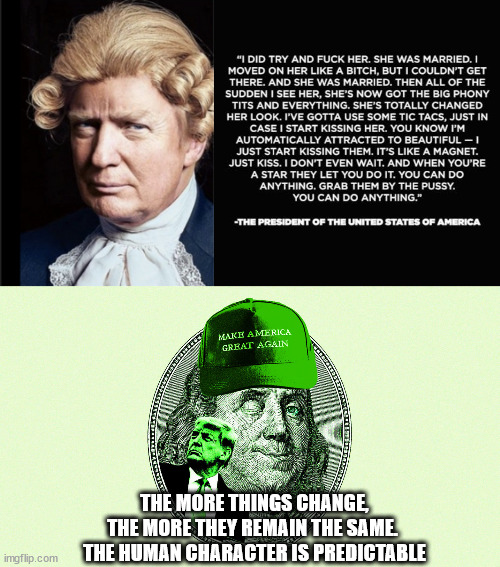The Duke
Diamond Member
- Jul 30, 2022
- 38,033
- 48,626
- 2,788
Those things do not mean what you think they mean, Spergy.George Washington said: “Virtue or morality is a necessary spring of popular government,”[6] and “Human rights can only be assured among a virtuous people.”[7]
Benjamin Franklin said: “Only a virtuous people are capable of freedom.” [8]
James Madison stated: “To suppose that any form of government will secure liberty or happiness without any virtue in the people, is a chimerical [imaginary] idea.”[9]
Thomas Jefferson wrote, “No government can continue good but under the control of the people; and … their minds are to be informed by education what is right and what wrong; to be encouraged in habits of virtue and to be deterred from those of vice … These are the inculcations necessary to render the people a sure basis for the structure and order of government.”[10]
Samuel Adams said: “Neither the wisest constitution nor the wisest laws will secure the liberty and happiness of a people whose manners are universally corrupt. He therefore is the truest friend of the liberty of his country who tries most to promote its virtue.”[11]
Patrick Henry stated that: “A vitiated [impure] state of morals, a corrupted public conscience, is incompatible with freedom.”[12]
Without Virtue There Can Be No Liberty - Mount Liberty College
It doesn't take much imagination to understand how they would view Stormy Daniels' paramour with the mushroom shaped unit. Or a soon to be sentenced felon. Or someone who famously admitted to grabbing women by the vagina whether they liked it or not. E. Jean Carroll didn't like it.
I could continue for some time but you get the gist. The Founders believed the health of our democracy relied on the participation of virtuous people. Not moral degenerates like Cheeto.

They mean like that thing my cousin always tells me.
What is it again?
Oh yeah:
"Go to Church!"









